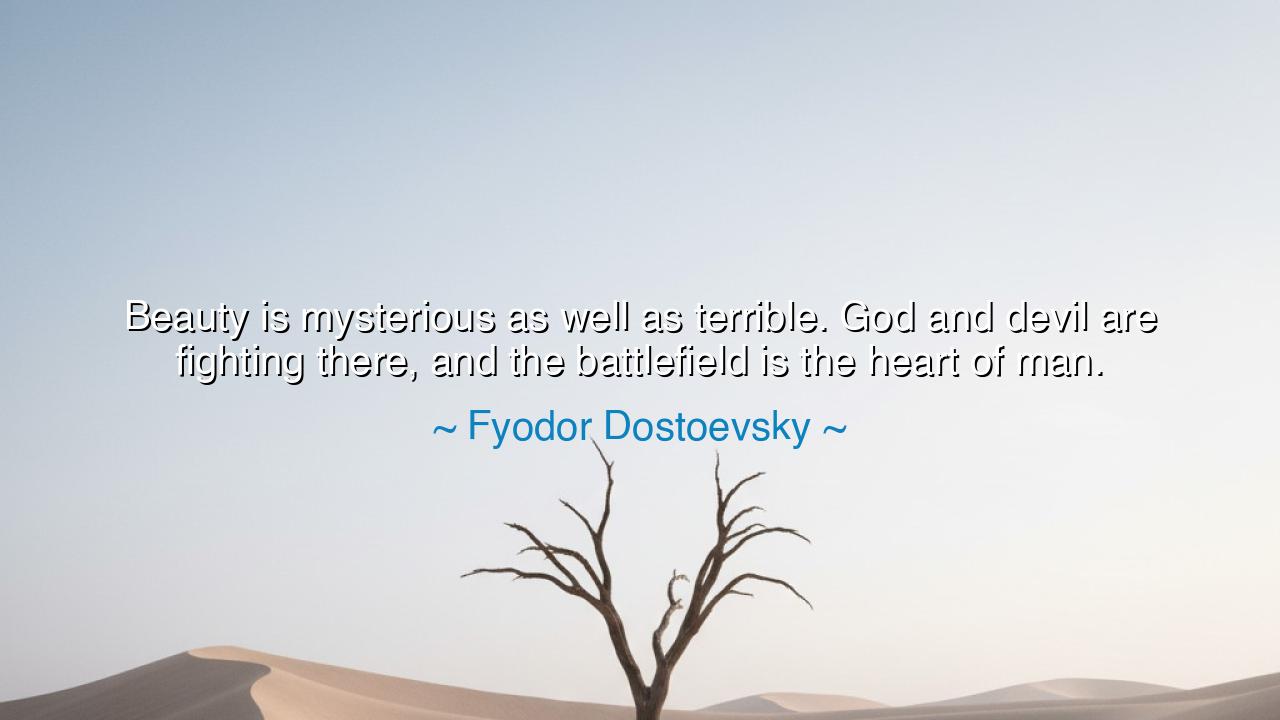
Beauty is mysterious as well as terrible. God and devil are
Beauty is mysterious as well as terrible. God and devil are fighting there, and the battlefield is the heart of man.






Host: The cathedral stood at the edge of the city, its spires clawing at the gray sky like fingers searching for forgiveness. Rain fell in slow, silver threads, dripping through the arches, glistening against the stone. The air was cold, thick with the scent of wax, incense, and memory.
Inside, the candles burned in quiet rows, their flames trembling as if afraid of their own light. Jack stood near the altar, his coat wet, his eyes dark, fixed on a single stained-glass window—a depiction of an angel and a serpent, both entwined around a heart of fire.
Jeeny entered quietly, her steps echoing on the stone floor, hair damp, face soft but steady. She watched him for a moment, the way one might watch a storm—with fear, wonder, and love.
Between them, carved into a slab of marble, the quote read:
“Beauty is mysterious as well as terrible. God and devil are fighting there, and the battlefield is the heart of man.” — Fyodor Dostoevsky.
Jeeny: “Do you believe that, Jack? That beauty could be both divine and damned?”
Jack: (without turning) “I believe Dostoevsky was right. Beauty isn’t a blessing, Jeeny. It’s a weapon. It cuts both ways.”
Host: His voice was low, gravelly, the kind that carried truth wrapped in pain. The rain tapped the windows, soft, steady, like a heartbeat that had forgotten how to rest.
Jeeny: “But isn’t that what makes it holy? The conflict? God and devil both fighting inside the same light?”
Jack: “No. That’s what makes it dangerous. People worship beauty, Jeeny. They kneel to it, lose themselves in it. And when the devil speaks through something so beautiful, no one can tell the difference.”
Jeeny: “You think beauty deceives. I think it reveals. It’s not the devil’s voice we hear—it’s our own desire echoing back.”
Jack: “Exactly. And that’s what makes it terrible. It shows us what we want more than what’s good. That’s why the battlefield is the heart. Because the heart doesn’t care about truth—it hungers.”
Host: The candles flickered, their flames leaning toward him, as if the room itself listened. Jeeny moved closer, her eyes dark, reflecting both light and shadow.
Jeeny: “Then maybe the heart’s hunger isn’t a curse, Jack. Maybe it’s a compass. You can’t seek what’s good unless you’ve been tempted by what’s not.”
Jack: “Temptation doesn’t teach you, Jeeny. It damages you. It leaves you bleeding, and all you learn is how to hide the scar.”
Jeeny: “Or how to love through it. That’s what Dostoevsky meant—beauty doesn’t just wound, it purifies. Pain is part of its alchemy.”
Jack: “You make it sound noble. But there’s nothing noble about suffering. It’s just what happens when beauty betrays you.”
Jeeny: “Or when we betray it. Beauty isn’t the enemy, Jack—we are. We turn it into lust, envy, power. But in its purest form, it’s a mirror of God.”
Host: Her voice rose, gentle but firm, like a bell ringing through fog. The rain intensified, drumming against the roof, filling the cathedral with a strange, living music.
Jack: “Then where’s the line, Jeeny? Between divine and destructive? Between worship and obsession?”
Jeeny: “The line’s inside us. The battlefield, remember? We draw it every day, with every thought, every choice. Beauty just shows us where the fight is.”
Host: Jack turned, finally, his eyes tired, but burning with a kind of sad understanding. His voice lowered, slowed, like a man confessing a truth he’d fought too long.
Jack: “When I was young, I met someone who was… extraordinary. Beautiful in that way that made you believe in something beyond yourself. But she lied. She used that light to pull people in, to control them. I thought she was grace, but she was just hunger wearing a halo.”
Jeeny: “And you never forgave her?”
Jack: “I never forgave myself. For not knowing the difference.”
Jeeny: “Maybe there was no difference, Jack. Maybe both were true. Maybe she carried both God and devil—like the rest of us.”
Host: The flames quivered, as if the air had heard something it didn’t want to believe. The angel and the serpent in the stained glass seemed to shift, colors blending, indistinguishable now between holiness and sin.
Jack: “So what, Jeeny? We’re all just battles in disguise?”
Jeeny: “Maybe. But that’s the miracle—that we can contain both heaven and hell and still choose to love. That’s what beauty really is: the tension between the two.”
Jack: “You think love can survive that kind of war?”
Jeeny: “It’s the only thing that ever has.”
Host: The rain slowed, softened, until it was just a whisper on the roof. The light from the candles reflected in the puddles along the floor, shimmering like liquid faith.
Jack: “You know… when I look at that window, I can’t tell which side is winning.”
Jeeny: “Neither ever does. That’s the point. The fight is what keeps us human.”
Jack: “And the heart?”
Jeeny: “The heart is the altar, Jack. It’s where both sides kneel.”
Host: The camera would have pulled back, slowly, the image of the two of them framed in the golden glow of candles, the window behind them still flickering between angel and serpent, light and dark, God and devil.
And in that cathedral, filled with echoes and firelight, one truth hung in the air, ancient, terrible, and beautiful:
That every heart is a battlefield,
and every battle is a prayer—
for the beauty that saves,
and the darkness that teaches.






AAdministratorAdministrator
Welcome, honored guests. Please leave a comment, we will respond soon